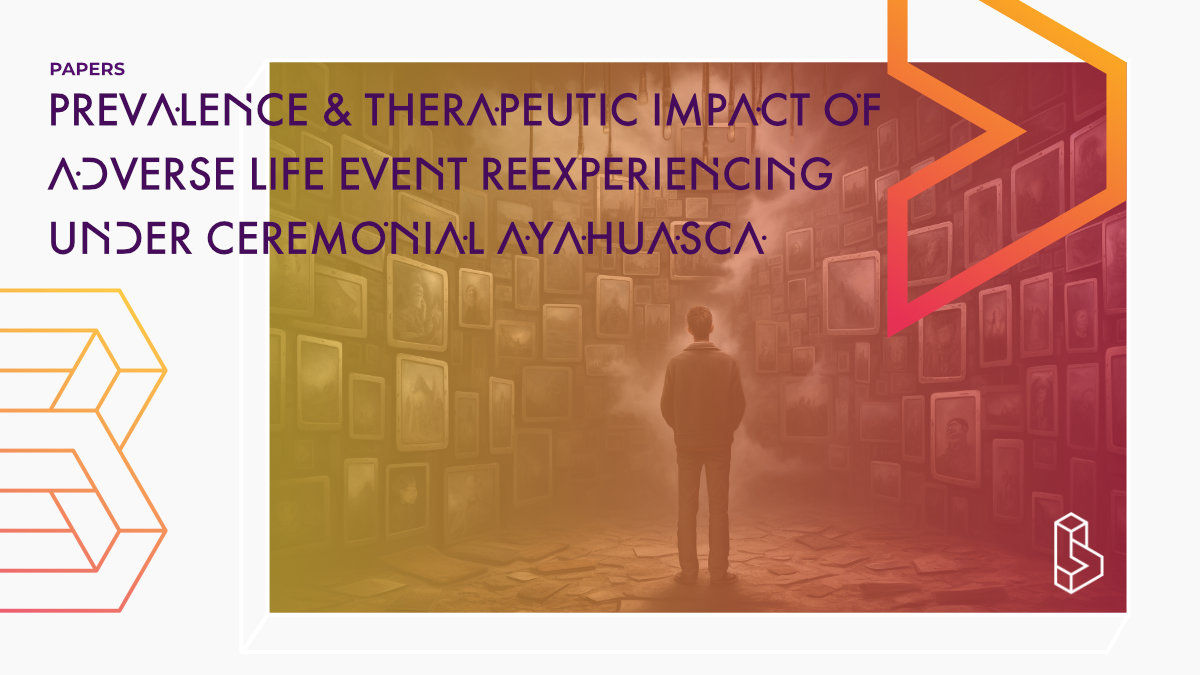This study (n=339, including 33 veterans) assessing the safety and efficacy of ceremonial ayahuasca use in relation to the reexperiencing of adverse life events found that reexperiencing adverse life events under ayahuasca was common, with women being more likely to reexperience sexual assault, veterans reexperiencing combat-related trauma, and individuals with a history of PTSD having a higher likelihood of reexperiencing. Additionally, reexperiencing was associated with cognitive reappraisal, psychological flexibility, and discomfort during ceremonies, but also with greater reductions in trait neuroticism post-ceremony. The implications of these findings for using psychedelics in treating mood and stress disorders were discussed.
Abstract of Prevalence and therapeutic impact of adverse life event reexperiencing under ceremonial ayahuasca
The present study examined the safety and efficacy of the ceremonial use of ayahuasca in relation to reports of heightened life event reexperiencing under psychedelics. The study examined (1) the prevalence of specific types of adverse life event reexperiencing, (2) characteristics predictive of reexperiencing, (3) the psychological character of reexperiencing, and (4) the impact of reexperiencing on mental health. Participants were recruited from three ayahuasca healing and spiritual centers in South and Central America (N = 33 military veterans, 306 non-veterans) using self-report data at three timepoints (Pre-retreat, Post-retreat, 3-months post-retreat). Reexperiencing adverse life events under ayahuasca was common, with women showing particularly high probability of reexperiencing sexual assault, veterans reexperiencing combat-related trauma, and individuals with a self-reported lifetime diagnosis of post-traumatic stress disorder exhibiting a substantively higher prevalence of reexperiencing. Reexperiencing was associated with states of cognitive reappraisal, psychological flexibility, and discomfort during ceremonies, and participants who reexperienced adverse life events exhibited greater reductions in trait neuroticism following their ceremonies. Clinical implications of these results for the application of psychedelics to mood and stress disorders are discussed.”
Authors: Brandon Weiss, Aleksandra Wingert, David Erritzoe & W. Keith Campbell
Summary of Prevalence and therapeutic impact of adverse life event reexperiencing under ceremonial ayahuasca
Psychedelic therapies are becoming increasingly accepted as tools for mental health care, but the properties of psychedelic experience pertinent to clinical efficacy and safety remain unknown. This is important to explore as it can inform psychedelic therapy’s suitability for trauma-focused application and the need for consent and safeguards surrounding psychedelic-induced trauma re-exposure.
Despite ongoing questions about efficacy and safety, little empirical data exists to inform them. This study examines the prevalence, proximal aetiology, character, and impact of adverse life event reexperiencing during the ceremonial use of ayahuasca and psychedelic experience more broadly.
Find this paper
Prevalence and therapeutic impact of adverse life event reexperiencing under ceremonial ayahuasca
https://doi.org/10.1038/s41598-023-36184-3
Open Access | Google Scholar | Backup | 🕊
Cite this paper (APA)
Weiss, B., Wingert, A., Erritzoe, D. et al. Prevalence and therapeutic impact of adverse life event reexperiencing under ceremonial ayahuasca. Sci Rep 13, 9438 (2023). https://doi.org/10.1038/s41598-023-36184-3
Study details
Compounds studied
Ayahuasca
Topics studied
Personality
Study characteristics
Open-Label
Participants
339
Humans
Authors
Authors associated with this publication with profiles on Blossom
David ErritzoeDavid Erritzoe is the clinical director of the Centre for Psychedelic Research at Imperial College London. His work focuses on brain imaging (PET/(f)MRI).

